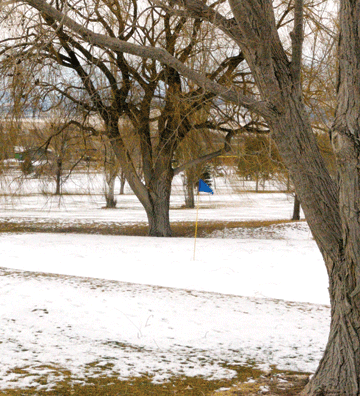|
- Former golf pro pleads no contest
|

COLD DAY AT CANYON HILLS • Above, the winter weather blows the snow and flag and Nephi’s Canyon Hills Golf Course. The fomer golf pro, John Fillmore, has pleaded “No Contest” to 10 charges of attempted misuse of public funds and will repay Nephi City an amount to be capped at $20,000. Fillmore will write a letter of appology to Nephi City and may be required to do some jail time at Juab County Jail, according to County Attorney Jared Eldridge.
By Myrna Trauntvein
Times-News Correspondent
John Fillmore, former golf pro at Nephi’s Canyon Hills Golf Course, entered a “no contest” plea to 10 charges of attempted misuse of public funds in 4th District Court in Nephi on Thursday.
Eyre said that, while technically not an admission of guilt for commission of the crime he, or any judge, would treat a plea of “no contest” as such an admission and proceeded to find the defendant guilty as charged.
Fillmore will now be sentenced on the 10 reduced charges which are each Class A misdemeanors. He will face the judge one more time, Feb. 26 at 9 a.m. in 4th District court, to receive that sentence.
“No contest” is often used where there has been a plea bargain in which the defendant does not want to admit guilt but accepts the sentence recommended by the prosecutor in exchange for not contesting the charge which, as in this case, is often reduced to a lesser crime.
“It is important to note that John Fillmore will write a letter of apology to the city,” said Eldridge. “He agreed to that stipulation.”
“Originally, there were 21 counts,” said Jared Eldridge, Juab County attorney.
Earlier, one of those counts, count 4, was dismissed by Judge Donald J. Eyre Jr.
Of the remaining 20 counts, Fillmore agreed to enter the no contest plea to the lesser charges of attempted misuse of public funds on 10 counts.
Misuse of public funds is considered a felony charge, not a misdemeanor.
Eyre said that, prior to sentencing, Fillmore must sit down with city officials to discuss repayment. The judge also referred Fillmore to Adult Probation and Parole prior to a sentence being given.
As part of the plea agreement, Fillmore must write a letter of apology to Nephi City.
The prosecution already had agreed to Fillmore serving any jail time on a work release basis, said Eldridge.
He will also repay the city an amount to be capped at $20,000.
Scott Card, the defense attorney representing Fillmore said that amount was accepted by his client though, at this point, the charges amounted to more than $9,000 and less than $10,000. However, the figure was agreed to by Fillmore with the understanding that no further charges would be levied and that no further financial records would be investigated other than the two years which were already reviewed.
“This will be a complete resolution,” said Card.
It is standard practice for the judge to ask, as did Judge Eyre, “Is there a factual basis for the plea?”
After receiving an affirmative answer, Eyre proceeded with the necessary questions requiring further affirmative answers from Fillmore and Card and then accepted the no contest plea and found the defendant guilty.
Eyre explained that the operation of a no contest plea is similar to a plea of guilty. A defendant who enters a no contest plea concedes the charges alleged without disputing or admitting guilt and without offering a defense.
“He (Fillmore) agreed to all stipulations as part of the negotiation settlement,” said Eldridge.
A no contest plea is accepted only with the consent of the court, and a judge is vested with discretion to accept or reject the plea.
The court must address several procedural concerns before accepting a no contest plea.
“Do you understand that you are waiving certain rights?” Eyre asked Fillmore.
Fillmore said he understood.
By entering the plea, Fillmore waived a right to a six-person jury trial and the right to appeal.
Generally, a defendant must tender a no contest plea knowingly and voluntarily. A plea is not deemed knowing and voluntary unless the defendant has a full understanding of the charges alleged and the legal ramifications of pleading no contest.
To ensure that the plea was freely tendered, Eyre inquired whether the defendant had received any threats or promises and was told that Fillmore had not.
Utah Code 76-8-401 defines the terms of “public monies,” “public funds,” and “public officer.”
Eldridge pointed out to the court that, under the legal definition, Fillmore was a public officer.
“On or on about the dates identified, he was a contract employee and did receive fees from 10 different individuals that should have been turned over to the city,” he said.
A no contest plea allows the defendant to avoid the expense and publicity of a trial. Another procedural advantage of a no contest plea is that it cannot be used against the accused in any civil suit for the same act.
|